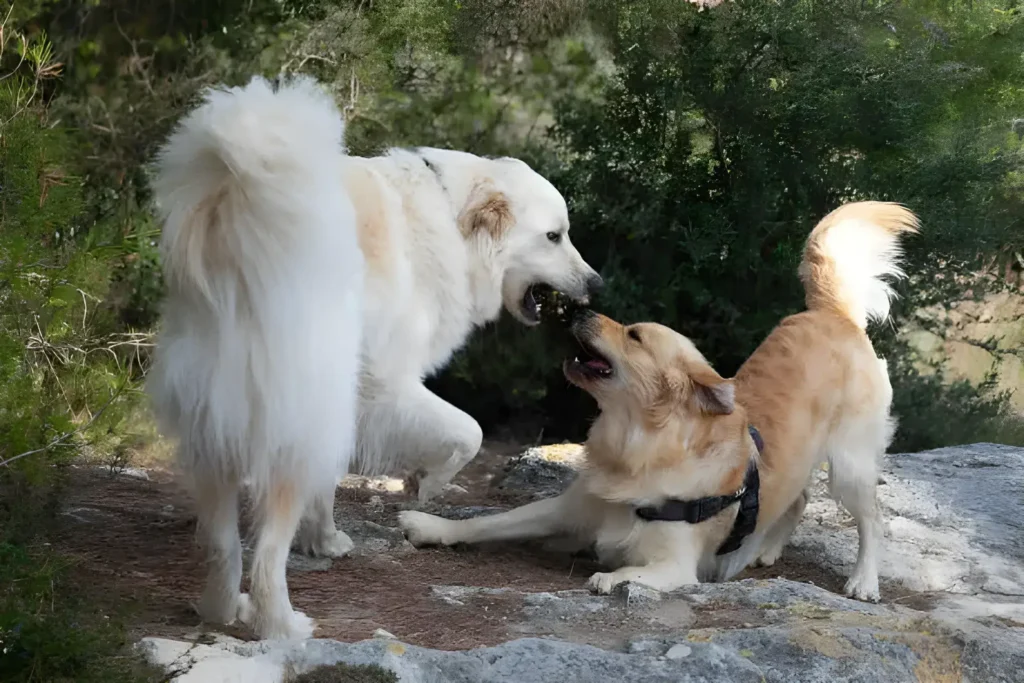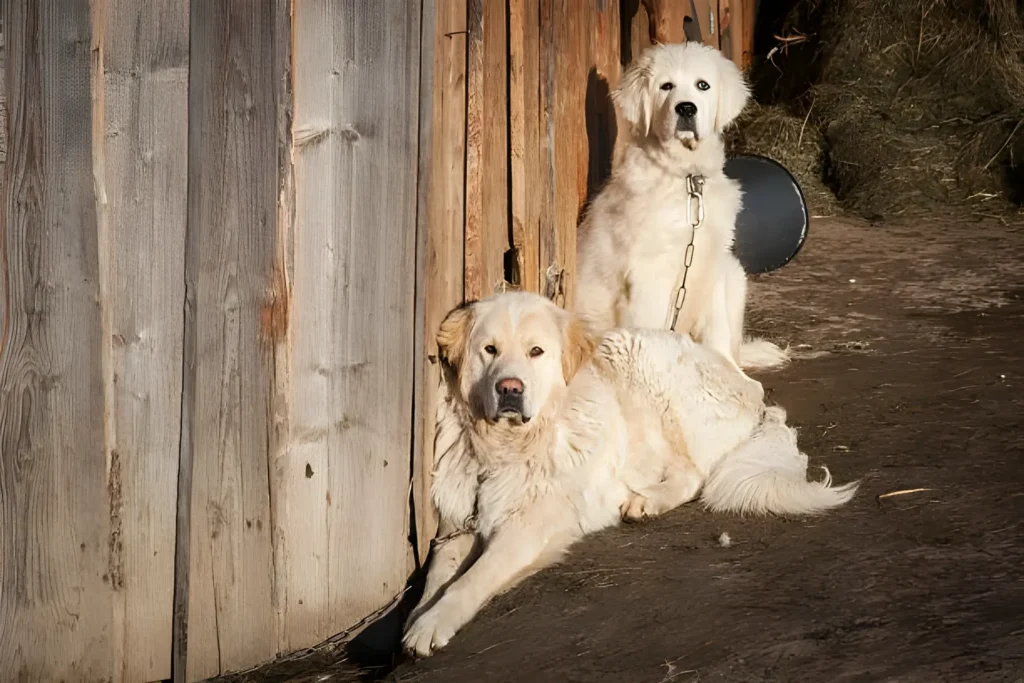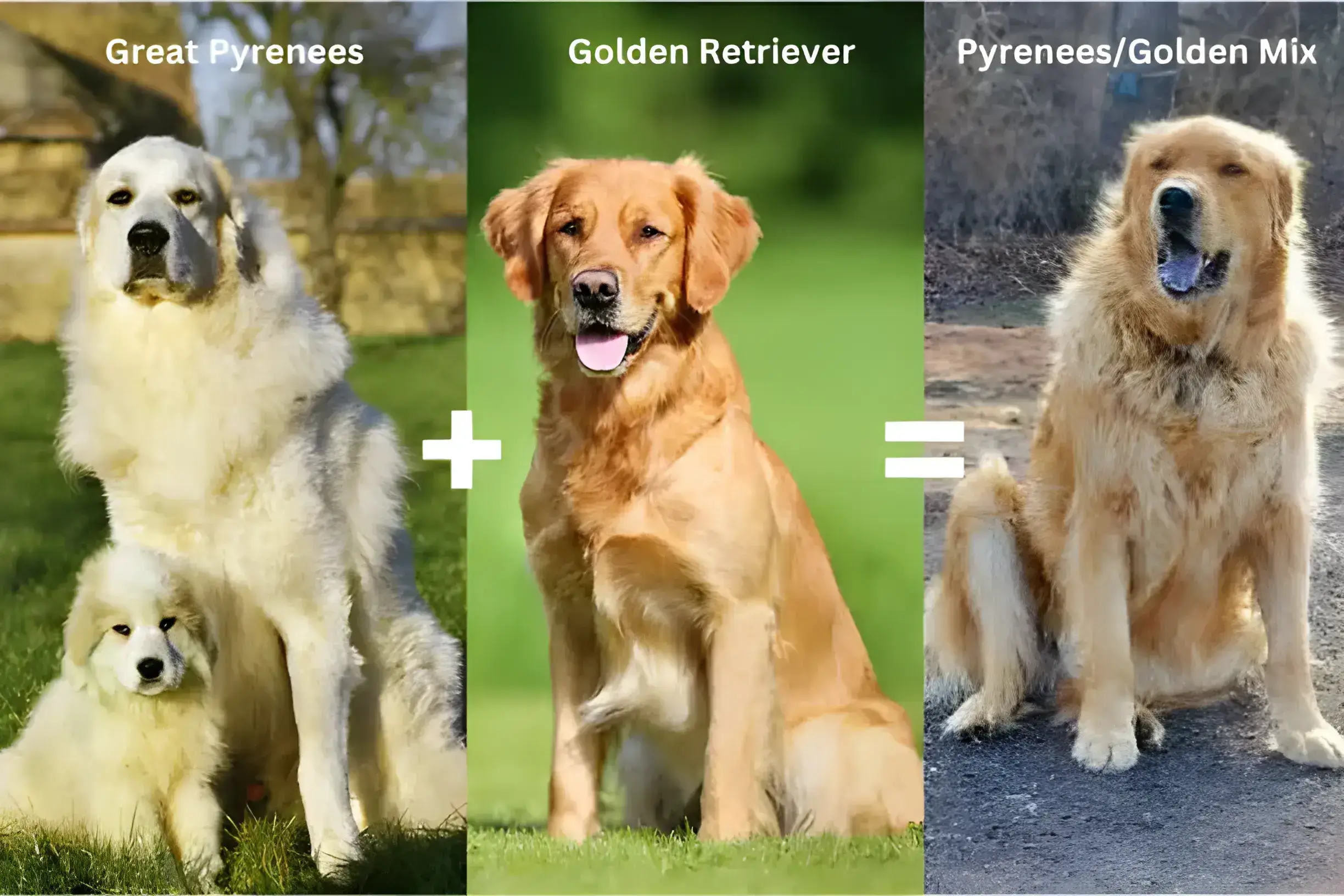If you’re seeking a devoted canine companion, but drawn to the distinct charms of the Great Pyrenees and Golden Retriever, the choice is far from easy. Both breeds are beloved for their loyalty, but offer vastly different experiences as pets. Let’s explore what makes each breed unique to help you find your perfect furry fit.
Quick Comparison Chart
Great Pyrenees vs. Golden Retriever vs. Pyrenees/Golden Mix
| Feature | Great Pyrenees | Golden Retriever | Pyrenees/Golden Mix |
|---|---|---|---|
| Appearance | |||
| Size | 25-32 inches tall, 85-120+ lbs | 21-24 inches tall, 55-75 lbs | Varies, likely large |
| Coat | Thick, white double coat | Golden, medium-length double coat | Varies: could be thick like a Pyrenees, or shorter like a Golden |
| Color | Primarily white | Golden shades | Wide range possible: white, cream, golden tones |
| Temperament | |||
| Overall | Independent, protective, calm | Friendly, playful, eager to please | Mix: loyal, affectionate, varying levels of protectiveness |
| With Strangers | May be wary | Typically welcoming | Depends on dominant parent breed |
| Training & Exercise | |||
| Trainability | Intelligent, but independent | Highly trainable, wants to please | Could inherit stubbornness (Pyrenees) or eagerness (Golden) |
| Exercise Needs | Moderate, mental stimulation crucial | High, needs physical & mental activity | Likely moderate-high |
| Guardian & Barking | |||
| Protection | Strong, bred as livestock guardian | Less pronounced, but alert | Could be strong (Pyrenees influence) |
| Barking | Deep, frequent bark | Barks at newcomers, less excessive | Varies, could have a strong bark |
| Health | |||
| Common Issues | Hip dysplasia, bloat, cancers, eye issues | Hip/elbow dysplasia, cancer, hypothyroidism | Mix of potential issues from both breeds |
| Lifestyle Match | |||
| Ideal Owner | Experienced, has space, wants protector | Active, enjoys training, adaptable dog | Experienced, has space, appreciates mix of traits, can handle coat care |
| Environment | Needs secure fencing, not ideal for apartments | Adaptable, needs exercise & companionship | Needs space, dedicated owner, not ideal for apartments |
Appearance: More Than Meets the Eye

Both Great Pyrenees and Golden Retrievers are large, beautiful dogs. However, their differences are striking:
Great Pyrenees: A majestic, bear-like breed with a thick white double coat. They stand 25-32 inches tall and weigh 85-120+ pounds.
Golden Retriever: Sporting a lustrous golden coat, they’re slightly smaller at 21-24 inches and 55-75 pounds. Their athletic build reflects their retrieving heritage.
Temperament: Gentle Giant vs. Eager to Please
Great Pyrenees: Independent, protective, and calm. Bred to guard livestock, they’re self-thinkers and less focused on human approval than some breeds. They exhibit a gentle, sweet nature with their family.
Golden Retriever: Famously friendly and eager to please. They thrive on human connection and are known for their playful, sometimes goofy, exuberance.
Trainability and Exercise Needs
Great Pyrenees: These intelligent dogs have a mind of their own, requiring a patient and consistent training approach. Focus on positive reinforcement. Moderate physical exercise is important, but mental challenges like puzzle toys or scent work are essential to keep them engaged and happy.
Golden Retriever: Eager learners who thrive on pleasing their humans. Positive training methods yield excellent results. Goldens need ample physical and mental activity to prevent boredom-related mischief. Consider activities like agility, obedience, or fetching to keep them fulfilled.
Guardian Instincts and Barking
Great Pyrenees: Bred to be livestock guardians, they have a deep, protective bark and can be wary of strangers. Extensive socialization is essential to prevent excessive territorial behavior.
Golden Retriever: While alert and likely to bark at newcomers, they are generally welcoming towards strangers and less prone to guarding behavior.
Grooming: A Labor of Love
Great Pyrenees: Their thick double coat requires regular, thorough brushing to prevent matting. They shed heavily, especially seasonally.
Golden Retriever: Moderate shedding year-round with seasonal blowouts. Their coat needs regular brushing but is less intensive than a Pyrenees.
Health Considerations
- Great Pyrenees: Prone to hip dysplasia, bloat, certain cancers, and eye issues.
- Golden Retriever: Susceptible to hip and elbow dysplasia, cancer, and hypothyroidism.
Responsible breeders for both work to minimize breed-specific health risks.
Lifestyle Match: Are You the Right Fit?
Great Pyrenees: These dogs are happiest with experienced owners who understand large, independent breeds. Securely fenced outdoor space is a must. They make excellent companions for those seeking a calm, watchful presence and don’t mind their occasional stubborn streak.
Golden Retriever: These adaptable dogs flourish in a variety of homes as long as they receive love, companionship, and plenty of activity. They are a wonderful match for energetic families and those who enjoy training and dog-related sports.
Hybrid Option: The Pyrenees/Golden Mix

Understanding the Mix: Combining a Great Pyrenees and Golden Retriever can result in a fantastic companion, but be aware of the potential challenges and rewards. Size and coat type can vary significantly, but they’ll likely be large dogs. Expect a mix of intelligence, loyalty, and affection, with the level of protective instinct depending on which breed is more dominant in the puppy.
Training and Socialization: Regardless of whether your mix inherits the Pyrenees’ independence or the Golden’s eagerness, patience and positive training methods are crucial. Early and ongoing socialization is vital, especially if the protective side of the Pyrenees is strong.
Environment and Needs: This mix generally needs plenty of space to roam and a dedicated family committed to providing exercise and mental stimulation. They may not be best suited for apartment living.
Note: Mixed breed dogs are unpredictable. Even with reputable breeders, it’s difficult to guarantee which parent breed’s traits will be dominant.
Where to Find a Mix:
Responsible Breeders: Some breeders specialize in this hybrid. Research carefully, ensuring they prioritize health testing and socialization.
Rescues: Shelters or breed-specific rescues occasionally have Pyrenees/Golden mixes.
Should You Consider a Great Pyrenees/Golden Retriever Mix?
This mix is a good fit for experienced dog owners who:
- Have the space to accommodate a large dog.
- Are dedicated to consistent training and socialization efforts.
- Enjoy the potential for a protective yet playful companion.
- Understand that coat care needs will vary depending on which breed’s traits are dominant.
Beyond the Breed: Finding Your Ideal Dog
While breed characteristics provide a strong foundation, every dog is an individual. Here are key factors to consider beyond the purebred label:
Age: A rambunctious puppy may be overwhelming if you seek a calmer companion. An adult dog’s personality is more established, but may come with prior training or behavioral needs.
Rescue: Don’t overlook shelter dogs or breed-specific rescues. You might find your perfect match with a dog in need of a loving home.
Temperament Testing: Reputable breeders often assess individual puppies’ personalities. This helps find the pup best suited to your lifestyle, whether outgoing or quieter.
Conclusion
Both the Great Pyrenees and Golden Retriever offer wonderful companionship, albeit in distinct ways. By honestly assessing your lifestyle, expectations, and experience level, you’ll increase your chances of finding a dog who isn’t just a great breed, but your great companion.
I hope you find this post helpful and informative. If Yes’ feel free to share it with your friends!
Frequently Asked Question
Can Great Pyrenees and Golden Retrievers live together?
With proper socialization and introductions, yes! Many households enjoy the mix of gentle protector and playful companion.
Are Great Pyrenees good for first-time dog owners?
Their independent nature can be challenging for those without prior dog experience. Thorough research and potentially working with a trainer is advisable.
Do Great Pyrenees need a job?
While not every Pyr needs to guard livestock, they benefit from mental stimulation and activities that satisfy their working instincts. This could be puzzle toys, scent work, or even dog sports.
I live in an apartment, is either breed suitable?
Neither are ideal apartment dogs due to their size and exercise needs. Smaller breeds may be a better fit.
Are Great Pyrenees good with children?
Great Pyrenees, with proper socialization, can be gentle and protective companions for children. However, supervise interactions, especially with toddlers, due to their size and potential for accidental bumping. Teach children respectful behavior around dogs.
Can a Great Pyrenees be left alone for long periods?
While independent, Great Pyrenees are social and crave companionship. Extended isolation can lead to boredom, barking, or destructive behaviors. Provide mental stimulation with puzzle toys and consider shorter periods of alone time or doggy daycare if you work long hours.
Do Golden Retrievers shed a lot? How do I manage shedding?
Goldens shed moderately year-round, with heavier “blowouts” twice a year. Regular brushing, a de-shedding tool, and a high-quality diet can help manage shedding.
Do Great Pyrenees bark a lot? Can barking be minimized?
Bred as guardians, they have a loud, protective bark. Early socialization and training to respond to “quiet” commands are important. However, expect more barking than with some other breeds.
Are Great Pyrenees hypoallergenic?
No dog is truly hypoallergenic, but Great Pyrenees, with their thick coat and shedding, are especially likely to trigger allergies. Consider breeds with less hair if allergies are a major issue.
Can a Great Pyrenees live in a hot climate?
Their dense fur makes them better suited to cooler temperatures. In warm climates, offer plenty of shade, and fresh water, limit strenuous exercise during peak heat, and ideally, keep them in air conditioning when temperatures soar.
How much exercise does a Golden Retriever need?
Think of Goldens as the athletes of the dog world – they’re built for activity! Be prepared to give them a good workout every day – think at least an hour of running, swimming, playing fetch, or whatever gets their hearts pumping. Goldens weren’t meant to be couch potatoes, and if they don’t get to let loose with that energy, they might start redecorating your home by chewing or digging!
What are some common health problems in Great Pyrenees?
Prone to hip dysplasia, bloat, certain cancers, and eye issues. Choose a breeder who conducts health screenings and work with a vet for regular checkups.
Are Golden Retrievers prone to separation anxiety?
Goldens thrive on human companionship, so some level of separation anxiety is possible. Gradual training to tolerate alone time, exercise before you leave, and calming aids may help.
What is the difference between a male and female Great Pyrenees?
Males tend to be slightly larger. Temperament differences are generally subtle, but some find females slightly more independent. Individual personality matters more than gender.
Can Great Pyrenees live with cats?
With careful introductions and socialization, many Pyrenees cohabit happily with cats. However, supervise interactions and provide the cat with safe spaces, especially initially.
Are Golden Retrievers good with small animals?
Their retriever instincts may lead them to chase smaller pets. Careful training and supervision are crucial. If you have small animals, consider the individual Golden’s prey drive during introductions.
What is the lifespan of a Great Pyrenees/Golden Retriever?
Great Pyrenees typically live 10-12 years, and Golden Retrievers 10-12 years. Responsible breeding and preventative health care can maximize lifespan for both breeds.
Is a Golden Retriever or Great Pyrenees better for a first-time dog owner?
Goldens, due to their eagerness to please, are generally easier for first-time owners. Pyreness, while wonderful dogs, require more experience with large breeds and independent personalities.
What are the costs of owning a Great Pyrenees/Golden Retriever?
Costs include purchase/adoption fees, food, vet care, grooming (especially for Pyrenees), toys, training, and potential pet insurance. Research average costs in your area.

